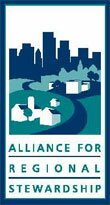Frequently Asked Questions (FAQs)
What is the Alliance for Regional Stewardship (ARS)?
What does ARS do?
What are Regional Stewards?
What is Regional Stewardship?
Why are Regions so important?
What Is ARS?
The Alliance for Regional Stewardship (ARS) is a national, peer-to-peer network of regional leaders working across boundaries to solve tough community problems. They come from business, government, education, and the civic sectors, but they share a common commitment to collaborative action and achieving results. ARS has embraced the challenge of the late John W. Gardner: “No more regionalism for its own sake. We now need pragmatic regionalism with a purpose.”
ARS was founded in May 2000 as a national network of leaders from metropolitan areas around the country. Elected officials, regional business leaders, and nonprofit organizations with regional missions realized they needed a place to learn about best practices and lessons learned from other parts of the country. ARS has attracted leaders from over 100 metropolitan and rural regions, both in the United States and around the world.
Our members are a network of practitioners sharing the best practices and lessons learned for the collaborative problem-solving necessary to meet the new challenges facing America’s metropolitan regions. We’re about turning good ideas into practice and developing regional stewards as a new brand of leaders.
Learn more about our principles, what we do, and what resources we offer.
What does ARS do?
The Alliance for Regional Stewardship was created in 2000 to serve as a coach and advisor to regional leaders and civic entrepreneurs around the country on the strategies and tactics that lead to results. ARS has begun to outline this strategy for website visitors to view through our working document: The ARS Blueprint for Achieving Regional Results
Through the following services, we help community leaders work together in a disciplined, structured way to achieve breakthrough results and build vibrant, competitive regions.
Learning Network
Central to ARS’s mission is building and supporting a national Learning Network of regional leaders and civic entrepreneurs from the public, private, and civic sectors.
Advisory Services
Since its inception, ARS consultants have served as strategic advisors to regions around the country.
Action Research
ARS will be continually learning about the diverse contexts for regional problem-solving, the changing nature of regional leadership and regional structure, and the lessons learned from both success and failure in regions around the country.
What are Regional Stewards?
Today’s regional challenges require a new level of problem-solving capability and the ability to work across political, sectoral and institutional boundaries. Regional stewards are leaders committed to the long-term well-being of places across boundaries of jurisdiction, sectors and disciplines to address complex regional issues such as sprawl, equity, education and economic development. They see the connection among economic, environmental and social concerns and they know how to “connect the dots” to create opportunities for their regions.
Regional stewards share basic values of creating broad prosperity; a healthy, attractive environment; and inclusive communities for ourselves and subsequent generations. They take the responsibility of ensuring that we pass on a better place to our children.
Regional stewards apply the same entrepreneurial spirit and persistence to solving regional challenges that business entrepreneurs apply to building a business; they are civic entrepreneurs. They see the need for more connected regional approaches to addressing economic, environmental and social issues; they are integrators. They build support from leaders, citizens, interest groups and policy professionals toward a shared regional vision; they are coalition builders. Regional stewards hold themselves and each other accountable to achieve tangible results and sustained outcomes.
Regional stewards include local elected or appointed officials, university and college leaders, executives of local businesses, foundation executives, non-profit leaders and community activists. What they have in common is the realization that to accomplish their goals they need to work collaboratively with people in other jurisdictions and sectors.
What is Regional Stewardship?
Regional stewardship combines the idea of “regional citizenship” with “stewardship of place.” Stewardship is the careful and responsible management of something placed in our trust. Regional stewardship is the commitment of regional leaders to place—the region in which they live and work.
Regional stewardship is about residents, businesses, government, educational institutions and community organizations acting as a network of responsibility. Regional stewardship takes John W. Gardner’s statement of “pragmatic regionalism with a purpose” and uses it as the foundation for critical principles to guide public policy and civic engagement that leads to new, open, inclusive and share decision-making and governance.
Why are Regions so important?
Regions are real places where people live and work. The institutional boundaries in regions are often dramatically at odds with the reality of the problems people need to address. Regional Stewardship is economic, organic, social, and strategic. It reflects directly the pressures for increased efficiency, for cohesion and competitive excellence.
Regional Stewardship recognizes the role of regions as the arena in which many challenges are best addressed. Some of the most innovative and constructive collaborations take place at the regional level.
Regional stewards seek ways to solve problems that spill over city and county boundaries. They know that communities working alone cannot effectively address critical issues such as job training, housing, traffic, youth development, air quality and water supply, and security and crime. These problems do not respect local political boundaries. Moreover, they are not limited to government, but also involve business and nonprofit organizations. They require a regional community collaborating on a cross-sector regional basis.
______________
|
Gain access to practical insights, advice, ideas, and cutting edge practices from around the country.
ARS is the nation’s premier peer-to-peer network of civic entrepreneurs working to build vibrant, globally competitive regions.
|

